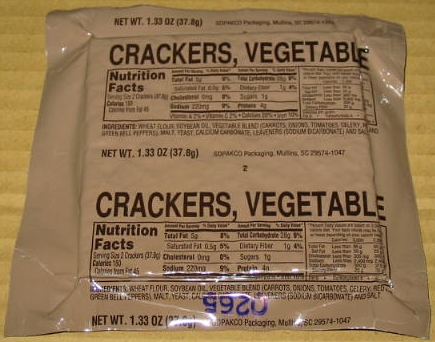Expiration Dates On Crackers
To read food expiration date codes, learn the different types of dates used for expiration codes. Determine if the code is using letters for months, the Julian calendar or a month-day-year code. In the United States there is no standard system for dating food, according to the Department of Agriculture.
On 'The Early Show on Saturday Morning,' dietitian, author of 'The F-Factor Diet,' shared some advice for this dietary dilemma and what the dates stamped on food products really mean. Zuckerbrot explained the three most common dates are Sell-By Date, Use-By Date, and Expiration Date. But what do they mean? Sell-By Date: Refers to the last day a retailer can display a product for sale; typically a food is safe to eat for 10 days after the Sell-by Date if refrigerated properly.
Use-By Date: Refers to the last day a product will maintain its optimum freshness, flavor, and texture. Beyond this date, the product begins to deteriorate although it is still edible. Expiration Date: Means what it says - if you haven't used a product by this date, toss it. Zuckerbrot pointed out a surprising fact: with the exception of baby food and infant formula, dating is not required by U.S. So how do you know what is good and what is not safe to eat?
Zuckerbrot shared how these food products are labeled and how long it's safe to eat them: Poultry and Meat Meat and poultry typically have a Sell-By date. You should use or freeze your chicken within one to two days of purchasing and meat within three to five days of purchasing. Freezing your poultry and meat can make these proteins last anywhere from nine to 12 months.
When freezing, it is important to make sure your poultry and meat is tightly wrapped in order to prevent it from freezer burn. Freezer burn does not make food dangerous to eat, but does damage the texture and taste. Dairy and Eggs Dairy and eggs typically have a Sell-By Date Proper refrigeration (40° F or below) is vital to ensure the best possible shelf life of your dairy.

According to the, the shelf life of milk is affected by several factors, including how it is handled before and after it is purchased. When stored at 40 degrees Fahrenheit and not left out of the refrigerator for extended time periods, milk should last approximately five to seven days past the 'sell by' date.' The type of cheese contributes to its shelf life. Soft cheese (cream cheese) will last up to two weeks, whereas a medium or hard cheese (cheddar) can last three to six months. Reports that the dates on egg cartons are not food expiration dates, but guidelines. Raw eggs can stay good for approximately three to five weeks after the date of purchase as long as they are not cracked or damaged. Baked Goods and Snack Foods Baked goods and snacks typically have a Use-By Date.
Expiration Dates On Prescription Drugs
Store-bought bread will typically last five to seven days at room temperature, but can last one to two weeks in the refrigerator. Fresh-baked bread do not contain preservatives, so they typically won't keep as long as commercially packaged breads. If the date on your bread or snacks has expired, it does not mean they have not gone bad. In fact, once something something goes stale it means that it has been depleted of moisture, which makes it less likely to grow mold. Try storing it in a plastic bag for extended shelf life. Snack foods contain preservatives in order to maintain shelf life.
Expiration Date On Keebler Crackers
Different types of snacks have varying expiration dates: Potato chips will last one month after expiration date. Crackers and pretzels can last up to three months. One of the longest lasting snacks is popcorn, which has a shelf life of one to two years. There is a myth that Twinkies can last upward of 50 years. However, this is urban legend. Twinkies can last for a lengthy 25 days without packaging, because dairy products are not a part of the recipe.